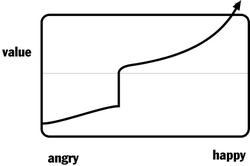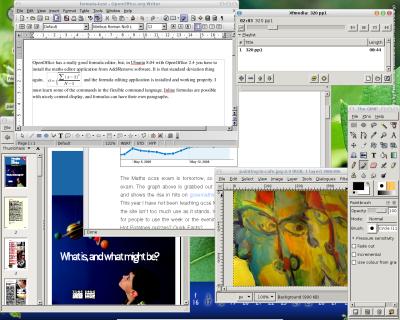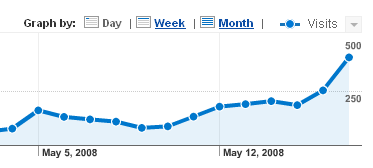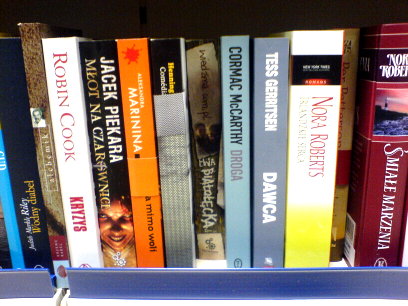May 30th, 2008
![50 Maths Ideas you really need to know [ front ]](../../images/50mathsideasyoureallyneedtoknowrecto.jpg)
Tony Crilly’s 50 Maths Ideas you really need to know is a smallish book with short summaries of some nice maths, see the scan of the back of the book for a list of the topics. The list includes zero, infinity, pi and e, as well as some geometry (including discrete geometry) and some probability concepts. The articles are three or four pages long, and they are written at a level where a beginning AS student or someone with more limited algebra could understand the main points. Many diagrams and plenty of continuous prose, nice metaphors.
The other reason I like this book is that it gets beyond arithmetic to real maths. So often in English speaking countries we get hung up on arithmetic so that many students never really learn about the logic of mathematical arguments, or about the huge range of applications. I am not suggesting that arithmetic is not important, and I am most certainly not suggesting ‘maths by colouring in’, but some wider content in GCSE and Access courses at level 2 might help motivation and change opinions I think.
Coming soon: my own top twenty mathematical ideas for level 2 maths….
Suggestion: Get the students searching on an idea each and see if they can come up with a Web page that they understand on their topic. Post back to forum. Evaluate.
![50 Maths Ideas you really need to know [ back with idea list ]](../../images/50mathsideasyoureallyneedtoknowverso.jpg)
Posted in Learning, Maths | Comments Off
May 28th, 2008
Seth Godin has a post about angry people and how you need to address the anger before any form of marketing can be successful. I’ve pinched his sketch graph here. My argument is that anxiety can act like anger, and ‘value’ could be ‘learning’.

Frederick Herzberg described a whole range of hygiene factors in a book published in 1959. I have found that fear of failure and the consequences that flow from that can act as a real barrier to learning in Mathematics.
The irony here is that by requiring everyone who wants to do certain jobs or to take certain University courses has a level 2 Maths qualification, we may be increasing Maths anxiety. I need to spend 10 minutes or longer sometimes on very specific anxiety reduction before I can tutor some students on a concept that takes about 15 minutes to cover and (say) another half hour to assimilate. Is that what we want?
Posted in Learning | No Comments »
May 27th, 2008
“We have noticed in nature that the behavior of a fluid depends very little on the nature of the individual particles in that fluid. For example, the flow of sand is very similar to the flow of water or the flow of a pile of ball bearings. We have therefore taken advantage of this fact to invent a type of imaginary particle that is especially simple for us to simulate. This particle is a perfect ball bearing that can move at a single speed in one of six directions. The flow of these particles on a large enough scale is very similar to the flow of natural fluids.”—Richard Feynman
Richard Feynman’s explanation of why cellular automata can be used to model fluid flow. From an article by W. Daniel Hillis, via daringfireball. I had no idea that Feynman worked for Thinking Machines. Most of the really clever people I have worked with have this ability to describe a process or problem in simple terms.
Posted in Notes | Comments Off
May 25th, 2008

I’ve installed a light Linux system on my Asus Pundit P1 PC based on the Debian Etch distribution – the stable branch. The Pundit uses Geoforce 6150 integrated graphics and I am using the open source nv driver – no bling or 3d effects. I have OpenOffice, Thunderbird, Firefox, a pdf viewer, and a simple mp3 file player. The desktop can recognise USB storage devices and puts an icon on the desktop when you plug one in. The minimal (or at least light) installations works as follows…
- Download the netinstall ISO from debian.org and burn it to a CD (only 180Mb)
- Ensure that you can connect your target computer to a broadband internet connection via a lan cable (plugged it into my ADSL modem/router)
- Boot into the installer cd and type ‘enter’ to use the text based install script
- Follow the screens – I have my home drive on a separate large partition so I always use manual partitioning and set the small 25 Gb partition as root and the large partition as home
- Choose a root password and a default user name and password
- Accept a net repository (mine is an ftp site in the UK)
- When you reach the screen that asks you to choose typical packages, you uncheck all the options. By default the ‘desktop’ and ‘standard’ options are pre-selected – I unselected those
- Only 6 files are downloaded, I accepted the option to install GRUB to the MBR
- I rebooted into a text only screen and logged in as root
Then I installed the following collection of packages using apt-get install...
apt-get install xorg gdm xfce4 xfce4-terminal xscreensaver alsa-base alsa-utils xfce4-mount-plugin gnome-volume-manager thunderbird firefox openoffice.org gnomebaker gftp xfmedia gimp evince
That is around 200Mb of download (hence the need to have a DHCP detectable broadband internet connection) and takes about 10 minutes to load up. Xorg asked about my no-name LCD monitor, so I selected the native resolution and unselected all the others. I rebooted the computer and ran alsaconf from the Terminal to detect my sound card. Everything was working OK.
The following Web sites helped…
Posted in Ubuntu | Comments Off
May 18th, 2008

The Maths GCSE exam is tomorrow, so good luck to anyone taking the exam. The graph above is grabbed out of my Google Analytics account and shows the rise in hits on gcsemaths.org.uk over the last week or so. This year I have not been teaching GCSE Maths and it is a new syllabus, so the site isn’t too much use as it stands. What would you provide on a site for people to use the week or the evening before an exam? Flashcards? Hot Potatoes quizzes? Quick Facts?
There is quite a discussion going on in the comments on a particular post.
Posted in Maths | Comments Off
May 16th, 2008

Recent books on sale in my local Polish shop – translated into Polish. Is this because Polish people want to know what the locals are reading but find it easier to read in the Mother tongue? And, for heaven’s sake,
Cormac McCarthy?
Posted in Notes, Photos | Comments Off
May 15th, 2008
“I started my blog (a) of course to promote my book (b) because there’s precious little out there cyberly for teaching creative writing in adult education. Almost all web and blogs, when I searched, target Adult Education and writing as literacy and ESOL, and target Creative Writing for teaching to primary, secondary and 6th form.”
Susan Lee Kerr is blogging about creative writing with adult students, and I have quoted from her e-mail (with permission) above. Susan contacted me after reading the Inform article I did and having a look at Blogging about Teaching.
Susan is blogging about her practice as an adult education teacher, and also as a self-published author of learning resources. I’ll find it interesting to see how much the blogging and the publishing work together. As self-publishing on paper is getting easier, I’m hoping we will see more individuals and Colleges publishing their stuff. It will save everyone time.
As I am employed, the IP in most of the learning materials I produce belongs to the College, so I provide samples on a no cost basis here from time to time.
Posted in ILT | Comments Off
![50 Maths Ideas you really need to know [ front ]](../../images/50mathsideasyoureallyneedtoknowrecto.jpg)
![50 Maths Ideas you really need to know [ back with idea list ]](../../images/50mathsideasyoureallyneedtoknowverso.jpg)



